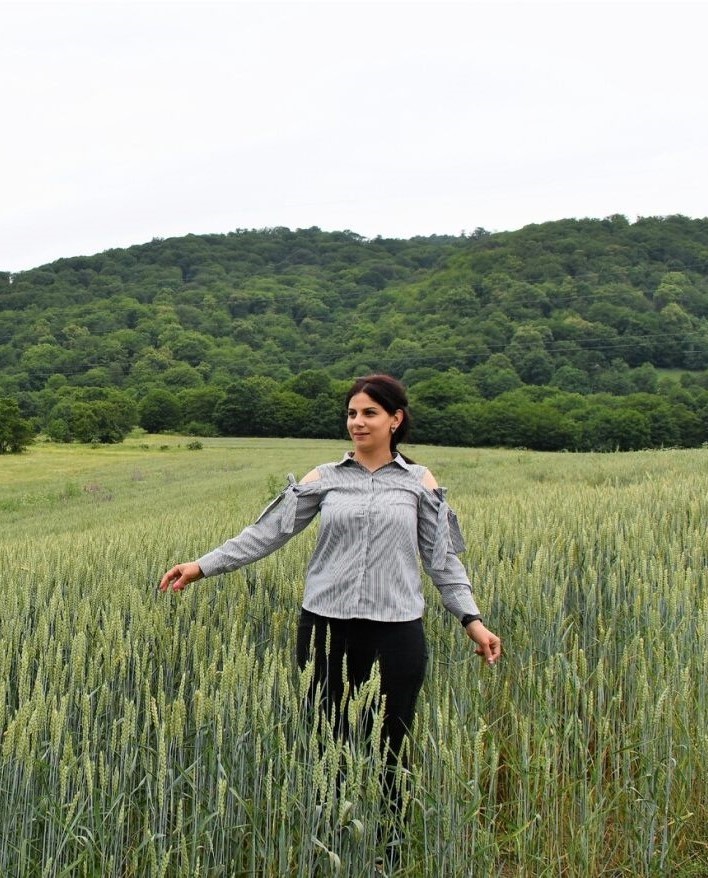03/05/2023
How boosting women’s confidence helps to address community needs in Armenia
- @FAO/Narine Bezirganyan. Anush Sargsyan in the newly grown grain fields
In Armenia, women’s participation in decision-making at the community level, especially in rural communities, is fairly low. According to the Country Gender Assessment of Armenia conducted in 2017, the principal reasons for their limited involvement in community leadership include gendered social norms, men’s lack of acceptance of women’s leadership, women’s fear of expressing themselves and a lack of self-confidence. Only a very small number of urban and rural municipalities are headed by women in Armenia. Our story is about one of these women – Administrative Head of Debet village of Lori region, Anush Sargsyan.
Anush is a 29-year-old woman. She is married, with two small daughters. She was appointed to the post of Administrative Head in January 2022. Around the same time, she was elected unanimously as the Chairperson of the Cooperative founded by farmers of Debet and its nearby rural settlements.
“Assuming such responsibilities required a high level of self-confidence and excellent communication and negotiation skills to be able to work effectively with the local population, including men of various ages, characters and occupations. Additionally, it often required advanced knowledge related to agriculture,” Anush recalls. She underlines how she felt the need to improve her knowledge and skills to be more effective in communicating with the villagers, her colleagues and higher-level local authorities.
In March 2022, she joined one of the groups in Lori to identify the priorities and objectives of a future Local Action Group (LAG), to be formed as part of FAO’s Local Empowerment of Actors for Development (LEAD) project supported by the European Union. LAGs aim to lead community-driven development strategies based on the needs and opportunities identified by members of communities.
“If one asks me about the two main things that the LAG meetings gave to me, the first one would be the building of confidence in terms of leading to identify, prioritize and address community needs. The second would be the gaining of agricultural knowledge through exchange of experience and opinions with experts and representatives of other communities. The LEAD project mentors highly encouraged us to voice and share our thoughts, and it helped to reveal important issues in Debet that otherwise might have remained unnoticed,” says Anush while reflecting on the benefits of participating in LAG meetings.
Though the LAG formation activities are still ongoing, and the results of their actions are expected this autumn, Anush has already been able to make tangible achievements in addressing community needs. As a result of negotiating with villagers and convincing them to make investments, for the first time since Armenia’s independence 30 years ago, 5 ha of community lands have been cultivated and 15 ha more will be cultivated this autumn. Moreover, the community cooperative purchased a combine harvester which will help to collect the grain this August from the cultivated lands.
“In a country with a high level of poverty, it takes huge efforts to convince villagers to invest in agriculture in a community with very limited sources of income. But the meeting with LAG members and the consultations with the experts of the LEAD project helped me to gain necessary knowledge and confidence for encouraging the community to do so,” Anush says.
Anush was glad to find out that the proposal of building water reservoirs for Debet and two neighbouring villages has been approved at its first stage and there are high chances that they will get funds from the LEAD project to implement this initiative. This will help to expand irrigation in these villages, opening up new opportunities for cultivating more land and earning greater income from farming.
“Now that the members of this and other communities see the first results of the actions led by me, they start trusting me more. This fact, in its turn, not only helps me to be more confident as a community leader, but also serves as a good example for other communities for overcoming gender stereotypes and entrusting women with managerial roles,” Anush reflects.
“After all, joining the efforts of all – men and women – is crucial for achieving success. As the proverb says, ‘If the village stands, it can break a trunk’, meaning that everything is easier to do if people unite. And that’s the motto of my work!” Anush adds, showing the writing on the Municipality Administration’s wall.
LEAD Project
Establishment of Local Action Groups is part of the LEAD Project supported by the European Union and implemented by FAO and the United Nations Development Programme in close partnership with Armenia’s Ministry of Territorial Administration and Infrastructure and Ministry of Economy. The four-year LEAD programme focuses on adapting and implementing the European Union’s LEADER methodology in the Lori and Tavush regions of Armenia and supports community-driven local and rural development initiatives carried out through partnerships uniting local authorities, civil society and the private sector.
NB: The original of this story was featured in the 8th issue of FAO Europe and Central Asia Gender Newsletter published in August 2022

